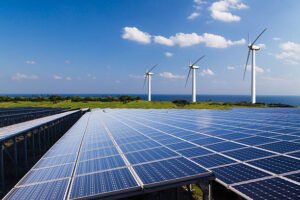Renewable energy comes from natural sources that are constantly replenished, such as sunlight, wind, water, and geothermal heat. Unlike fossil fuels like coal and oil, which are finite and contribute to pollution and climate change, renewable energy sources are clean, abundant, and sustainable.
 Renewable Energy
Renewable EnergyTypes of Renewable Energy:
- Solar Energy: Solar energy harnesses the power of the sun using solar panels. These panels convert sunlight into electricity, which can be used to power homes, businesses, and even entire cities.
- Wind Energy: Wind turbines capture the kinetic energy of the wind and convert it into electricity. Wind farms, consisting of multiple turbines, are often built in windy areas to generate large amounts of clean energy.
- Hydroelectric Energy: Hydroelectric power plants use the energy of flowing water, such as rivers or waterfalls, to generate electricity. By damming rivers, water can be stored and released to turn turbines, producing renewable energy.
- Geothermal Energy: Geothermal energy taps into the Earth’s natural heat from beneath the surface. This heat can be used directly for heating buildings or converted into electricity through geothermal power plants.
Benefits of Renewable Energy:
- Clean Air: Unlike fossil fuels, renewable energy sources produce little to no air pollution, helping to improve air quality and reduce health problems like asthma and respiratory diseases.
- Combatting Climate Change: By reducing our reliance on fossil fuels, renewable energy helps to lower greenhouse gas emissions, which are the primary drivers of climate change. This is crucial for protecting our planet and future generations.
- Energy Independence: Renewable energy sources are abundant and available locally in many regions, reducing dependence on imported fossil fuels and enhancing energy security.
- Job Creation: The renewable energy sector creates numerous job opportunities in manufacturing, installation, maintenance, and research, helping to stimulate economic growth and development.
Challenges and Considerations:
While renewable energy offers many benefits, it also faces some challenges:
- Intermittency: Unlike fossil fuels, which can provide constant power, some renewable energy sources like solar and wind are intermittent, meaning they depend on weather conditions. Developing energy storage technologies and improving grid infrastructure can help address this challenge.
- Land Use: Large-scale renewable energy projects, such as wind and solar farms, require significant land area. Balancing the need for clean energy with land conservation efforts is essential to minimize environmental impacts.
- Initial Costs: While the long-term costs of renewable energy are competitive with fossil fuels, the initial investment in infrastructure can be high. However, as technology advances and economies of scale are achieved, renewable energy is becoming increasingly affordable.
Why Renewable Energy Matters:
Renewable energy is essential for transitioning to a more sustainable and resilient energy system. By harnessing the power of nature, we can reduce pollution, mitigate climate change, and create a healthier and more prosperous future for all.
As individuals, we can support renewable energy by advocating for clean energy policies, investing in renewable energy projects, and making energy-efficient choices in our daily lives. Together, we can build a brighter tomorrow powered by clean, renewable energy sources.


